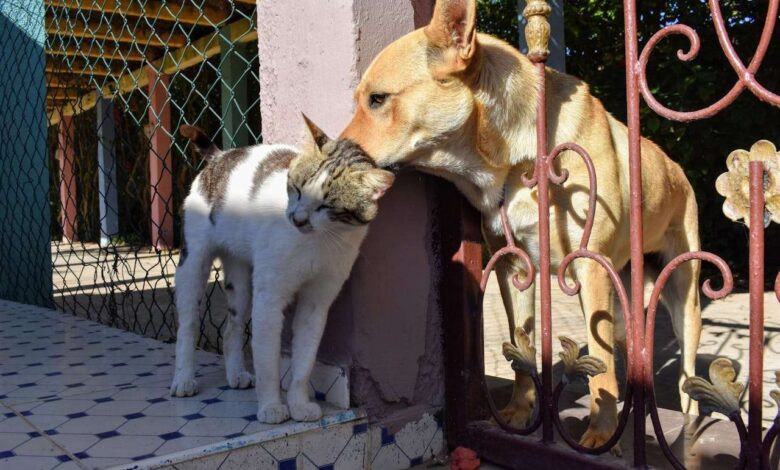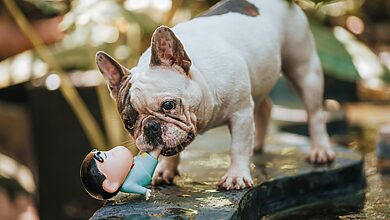Cats vs Dogs: Which Pet is the Perfect Match for You?

Choosing between a cat and a dog as a pet is a significant decision that can impact your life in many ways. These two beloved companions offer distinct experiences that cater to different lifestyles, personalities, and needs. While some people are naturally drawn to the independent, graceful nature of cats, others find joy in the loyal, energetic presence of dogs. Understanding the key differences in personality traits, lifestyle compatibility, time commitment, living space, financial considerations, and more can help you make an informed choice.
In this comprehensive guide, we will explore the factors that should influence your decision, helping you determine whether a cat or a dog is the perfect match for you. Whether you’re looking for a quiet companion to share your living space or an active partner to join you on outdoor adventures, this article will provide you with the insights needed to choose the right pet.
Personality Traits: Cats vs Dogs
Cats: Independent and Mysterious
Cats have long been admired for their independent and somewhat mysterious nature. Unlike dogs, cats are often content to spend time alone, exploring their environment at their own pace. They are known for being self-sufficient, often preferring solitary activities like lounging, napping, or quietly observing their surroundings.
While cats can be affectionate, they typically express their love on their terms. This means that they may not always be as eager to please as dogs, but their affection is genuine and heartfelt when offered. Cats are also known for their curiosity and intelligence, often finding joy in simple pleasures like chasing a laser pointer or exploring a new cardboard box.
Key personality traits of cats:
- Independent and self-sufficient
- Curious and exploratory
- Affectionate, but on their terms
- Often quiet and reserved
For those who appreciate a pet that can entertain itself and doesn’t require constant attention, a cat might be the ideal choice. However, it’s important to remember that cats still need love, interaction, and stimulation to thrive.
Resources:
- ASPCA: Cat Behavior
- The Humane Society: Understanding Your Cat’s Behavior
Dogs: Loyal and Social
Dogs, in contrast, are known for their loyalty and social nature. They thrive on interaction with their owners and other dogs, often forming deep emotional bonds that make them wonderful companions. Dogs are pack animals by nature, and they typically enjoy being part of a family or social group.
Dogs are often described as “man’s best friend” because of their unwavering loyalty and affection. They are more emotionally expressive than cats, often seeking out attention, playtime, and companionship. Whether it’s playing fetch, going for a walk, or simply sitting by your side, dogs are happiest when they can be near their owners.
Key personality traits of dogs:
- Loyal and affectionate
- Social and interactive
- Energetic and playful
- Often vocal and expressive
If you enjoy spending time with your pet, engaging in activities, and being greeted with enthusiasm when you come home, a dog might be the perfect match for you. However, be prepared to invest time and effort into training, exercise, and socialization.
Resources:
- American Kennel Club: Understanding Dog Behavior
- ASPCA: Dog Behavior
Lifestyle Compatibility: Cat or Dog Person?
Your lifestyle plays a crucial role in determining whether a cat or a dog is the right fit for you. Pets are a long-term commitment, and it’s essential to choose a pet that aligns with your daily routines, social habits, and overall lifestyle.
Active vs. Sedentary Lifestyle
If you lead an active lifestyle and enjoy outdoor activities like hiking, running, or playing sports, a dog may be the perfect companion for you. Many dog breeds require regular exercise to stay healthy and happy, and they will gladly join you on your adventures. Whether it’s a brisk walk around the neighborhood or a weekend hike in the mountains, dogs are always eager to be part of the action.
On the other hand, if you prefer a more sedentary lifestyle, enjoy reading a book at home, or have a busy work schedule that keeps you indoors, a cat may be a better fit. Cats are generally more independent and require less physical activity, making them suitable for people who may not have the time or inclination for daily exercise. They are content to lounge in a sunny spot or explore their indoor environment, making them an excellent choice for those with a more relaxed lifestyle.
Resources:
- PetMD: How Much Exercise Does a Dog Need?
- Petfinder: Are You a Cat Person or a Dog Person?
Homebody vs. Social Butterfly
Are you someone who enjoys quiet evenings at home, or do you frequently host gatherings and social events? Your social habits can influence whether a cat or a dog is the right pet for you.
Cats typically prefer a calm and stable environment. They can become stressed or anxious in chaotic or noisy surroundings, making them well-suited for quieter households. If you enjoy spending your evenings reading, watching TV, or working on hobbies, a cat might be the perfect companion to share your space.
Dogs, especially social breeds, thrive in environments where they can interact with people and be part of the action. If you enjoy hosting parties, having friends over, or being out and about, a dog will likely enjoy the social atmosphere and the opportunity to meet new people. Dogs can be great conversation starters and often become the life of the party.
Resources:
- VCA Animal Hospitals: How to Help Your Cat Adjust to a New Home
- Rover: Tips for Socializing Your Dog
Travel Frequency
Consider how often you travel and whether you have someone to care for your pet while you’re away. Travel frequency is an important factor in determining the right pet for you.
Cats are generally more self-sufficient and can be left alone for longer periods, provided they have enough food, water, and a clean litter box. If you travel frequently for work or leisure, a cat may be a more practical choice. You can also consider hiring a pet sitter or asking a friend to check in on your cat while you’re away.
Dogs, however, require more attention and care, making frequent travel more challenging. If you have a dog, you’ll need to arrange for a pet sitter, dog walker, or dog boarding service whenever you’re away. Some dogs may experience separation anxiety when left alone for extended periods, so it’s important to plan ahead and ensure they receive the care and attention they need.
Resources:
- TrustedHousesitters: Pet Sitting Services
- Rover: Dog Boarding Services
Time Commitment: How Much Time Can You Dedicate?
Owning a pet is a significant time commitment, and the amount of time you can dedicate to your pet should play a major role in your decision-making process.
Cats: Low-Maintenance Companions
Cats are often considered low-maintenance pets, making them an excellent choice for busy individuals or those with demanding schedules. They groom themselves, use a litter box, and can be left alone for several hours without getting anxious. However, they still need regular feeding, playtime, and affection to thrive.
Daily time commitment for cats:
- Feeding: 10-15 minutes
- Playtime: 20-30 minutes
- Litter box maintenance: 5-10 minutes
Cats may also benefit from interactive toys, scratching posts, and climbing structures that keep them mentally and physically stimulated. While cats may not require as much direct attention as dogs, they still need interaction and care to prevent boredom and behavioral issues.
Resources:
- Chewy: Interactive Cat Toys
- PetMD: How to Keep Your Indoor Cat Entertained
Dogs: High-Maintenance and Social
Dogs require more time and attention than cats, making them a better fit for individuals or families who can dedicate time to their care. Dogs need regular exercise, training, grooming, and social interaction to stay healthy and happy.
Daily time commitment for dogs:
- Feeding: 10-15 minutes
- Exercise and playtime: 1-2 hours
- Training and grooming: 20-30 minutes
The time commitment for a dog can vary depending on the breed, age, and individual needs. Puppies, for example, require more time for training and socialization, while senior dogs may need more frequent vet visits and specialized care. If you’re prepared to invest the time and effort required to care for a dog, the rewards of their companionship can be immense.
Resources:
- PetMD: Dog Grooming Tips
Living Space: Is Your Home Cat or Dog-Friendly?
Your living space is another critical factor to consider when choosing between a cat and a dog. Different pets have different space requirements, and it’s essential to ensure your home is suitable for your new companion.
Cats: Adaptable and Compact
Cats are incredibly adaptable and can thrive in various living environments, from small apartments to large homes. They don’t require much space and can make the most of vertical areas by climbing on furniture, shelves, and cat trees. As long as they have a cozy spot to relax, a litter box, and some toys, cats can be content in even the smallest living spaces.
Key considerations for a cat-friendly home:
- Safe and secure windows (especially in high-rise apartments)
- Space for a litter box
- Vertical spaces for climbing and exploring
Cats are also known for their agility and love of high places, so providing them with opportunities to climb and explore vertically can enhance their living experience. Investing in cat trees, shelves, and scratching posts can help create a stimulating environment for your feline friend.
Resources:
- Chewy: Cat Trees and Condos
- PetMD: How to Make Your Home Cat-Friendly
Dogs: Space and Access to Outdoors
Dogs generally need more space than cats, especially larger breeds. They benefit from having access to a yard or outdoor space where they can run, play, and relieve themselves. If you live in a small apartment or a home without a yard, you may need to take your dog for multiple daily walks to ensure they get enough exercise.
Additionally, some dog breeds are better suited to smaller living spaces, so it’s important to research the breed’s specific needs before making a decision. Smaller breeds like Dachshunds, French Bulldogs, and Chihuahuas may adapt well to apartment living, while larger breeds like Labrador Retrievers, German Shepherds, and Golden Retrievers may require more space and outdoor access.
Key considerations for a dog-friendly home:
- Space for a dog bed and play area
- Access to outdoor space or nearby parks
- Noise considerations (dogs may bark, which could be an issue in apartments)
If you live in a rental property, it’s also important to check with your landlord about pet policies and ensure that your living space meets any requirements for pet ownership.
Resources:
- Rover: Dog-Friendly Apartments
- American Kennel Club: Best Dog Breeds for Apartments
Financial Considerations: Cost of Ownership
Owning a pet is not just an emotional investment; it’s also a financial one. The cost of pet ownership varies depending on the type of pet, breed, and individual needs. It’s essential to budget for the ongoing expenses of caring for a pet, including food, veterinary care, grooming, and supplies.
Cats: Lower Overall Costs
Cats are generally less expensive to care for than dogs. They require fewer supplies, and their food and veterinary costs are typically lower. However, it’s essential to budget for ongoing expenses such as food, litter, toys, and regular vet check-ups. Additionally, some cats may have specific health needs that could increase costs.
Estimated annual costs for a cat:
- Food: $150-$300
- Litter: $100-$200
- Veterinary care: $100-$300
- Toys and supplies: $50-$100
It’s also important to consider the cost of unexpected veterinary expenses, such as illness or injury. Pet insurance can be a valuable investment to help cover these costs and provide peace of mind.
Resources:
- ASPCA: Pet Care Costs
- Pets Best: Pet Insurance for Cats
Dogs: Higher Costs, Especially for Larger Breeds
Dogs tend to be more expensive to care for, especially larger breeds. In addition to food, toys, and veterinary care, dogs may require grooming, training, and pet insurance. If you choose to adopt a dog, you may also need to pay for spaying or neutering, vaccinations, and other initial medical costs. The breed and size of the dog will significantly impact the overall cost of ownership.
Estimated annual costs for a dog:
- Food: $250-$700 (depending on size)
- Veterinary care: $200-$500
- Grooming: $30-$500 (depending on breed)
- Toys and supplies: $100-$300
Some breeds, such as Poodles and Shih Tzus, require regular professional grooming, which can add to the overall cost. Additionally, larger breeds may have higher food and medical expenses, so it’s essential to consider these factors when budgeting for a dog.
Resources:
- Petfinder: Cost of Owning a Dog
- Healthy Paws: Dog Insurance Plans
Allergies and Sensitivities: Cat or Dog-Friendly Homes
Allergies and sensitivities are essential considerations when deciding between a cat and a dog. Pet allergies are relatively common and can cause discomfort or health issues for some individuals. It’s important to understand the potential allergenic factors associated with each type of pet and take steps to minimize exposure.
Cats: Common Allergens
Cat allergies are often triggered by a protein found in a cat’s skin cells, urine, and saliva. This protein, known as Fel d 1, can become airborne and cause allergic reactions in sensitive individuals. Symptoms of cat allergies can include sneezing, itching, watery eyes, and respiratory issues.
If you or someone in your household has cat allergies, it’s crucial to consider hypoallergenic cat breeds or alternative pets. While no cat breed is entirely hypoallergenic, some produce fewer allergens and may be more suitable for individuals with mild allergies. Regular grooming and cleaning can also help reduce allergens in your home, but it’s not a guaranteed solution.
Common hypoallergenic cat breeds:
- Siberian
- Balinese
- Devon Rex
Additionally, investing in air purifiers and using allergen-reducing cleaning products can help manage cat allergies. It’s also a good idea to create designated pet-free zones in your home, such as bedrooms, to minimize exposure to allergens.
Resources:
- Allergy & Asthma Network: Pet Allergies
- Chewy: Hypoallergenic Cat Breeds
Dogs: Variable Allergen Levels
Dog allergies are typically caused by proteins found in a dog’s skin cells, urine, and saliva. These proteins can become airborne and trigger allergic reactions in sensitive individuals. Similar to cat allergies, symptoms can include sneezing, itching, watery eyes, and respiratory issues.
Some dog breeds are more hypoallergenic than others, meaning they produce fewer allergens. Breeds with hair instead of fur, such as Poodles and Bichon Frises, are often recommended for individuals with allergies. However, it’s important to note that no dog breed is entirely hypoallergenic, and individual reactions may vary.
Common hypoallergenic dog breeds:
- Poodle
- Bichon Frise
- Portuguese Water Dog
If allergies are a concern, consider hypoallergenic dog breeds and take steps to reduce allergens in your home, such as regular grooming, vacuuming, and using air purifiers. Bathing your dog regularly can also help reduce the amount of dander and allergens in your home.
Resources:
- Asthma and Allergy Foundation of America: Pet Allergy
- American Kennel Club: Hypoallergenic Dog Breeds
Adoption vs. Buying: Ethical Considerations
When deciding to bring a pet into your home, you have the option to adopt from a shelter or purchase from a breeder. Both options have ethical considerations that should be taken into account. Understanding the implications of each choice can help you make a responsible decision that aligns with your values.
Adoption: Saving Lives and Supporting Shelters
Adopting a pet from a shelter or rescue organization is a compassionate choice that can save lives. Many cats and dogs in shelters are in need of loving homes, and by adopting, you’re giving them a second chance. Adoption fees are generally lower than purchasing from a breeder, and the animals are often spayed/neutered, vaccinated, and microchipped. Additionally, adopting helps reduce the overpopulation problem and supports the work of shelters.
Benefits of adoption:
- Saving a life
- Lower cost than buying
- Supporting ethical practices
Shelters and rescue organizations often have a variety of pets to choose from, including different breeds, ages, and temperaments. Many shelters also provide resources and support to help you integrate your new pet into your home. If you’re considering adoption, be sure to visit your local shelter or explore online platforms that connect you with adoptable pets.
Resources:
Buying: Responsible Breeding and Breed-Specific Needs
While adoption is a wonderful option, some individuals may choose to purchase a pet from a breeder, especially if they are looking for a specific breed with certain traits. If you decide to buy a pet, it’s crucial to choose a responsible breeder who prioritizes the health and well-being of their animals. Avoid puppy mills and unethical breeders who prioritize profit over the welfare of their animals.
When buying a pet, consider the following:
- Research the breeder’s reputation
- Ensure the breeder follows ethical breeding practices
- Understand the specific needs of the breed
Responsible breeders will provide health clearances, socialization, and proper care for their animals. They should also be willing to answer any questions you have about the breed, the care required, and the animal’s background. While buying from a breeder can be more expensive, it allows you to choose a specific breed that fits your lifestyle and preferences.
Resources:
- American Kennel Club: How to Find a Responsible Breeder
- Best Friends Animal Society: The Truth About Puppy Mills
The Role of Children: Pets and Family Dynamics
If you have children or plan to start a family, it’s essential to consider how a pet will fit into your family dynamics. Both cats and dogs can make wonderful companions for children, but they have different needs and temperaments that should be considered.
Cats: Quiet Companions
Cats can be excellent companions for children, especially those who appreciate a more relaxed and independent pet. Many cats enjoy the company of children but may prefer a quieter environment where they can retreat when needed. It’s important to teach children how to interact with cats gently and respectfully, as some cats may become stressed or defensive if handled roughly.
Cats are often a good choice for families with older children who understand boundaries and can appreciate a pet that may not always seek out attention. Additionally, some cat breeds, such as Ragdolls and Maine Coons, are known for their gentle and affectionate nature, making them well-suited for families.
Resources:
- The Spruce Pets: Best Cat Breeds for Kids
- PetMD: Teaching Kids How to Treat Cats
Dogs: Playful and Protective
Dogs are often considered ideal pets for families with children due to their playful and protective nature. Many dog breeds are known for their gentle temperament and ability to bond with children. Dogs can teach children responsibility, empathy, and the importance of caring for another living being.
When choosing a dog for a family with children, it’s essential to consider the breed’s temperament, energy level, and size. Some breeds, such as Golden Retrievers, Labradors, and Beagles, are known for being good with children and can adapt well to family life. However, it’s important to supervise interactions between dogs and young children to ensure safety and positive experiences for both.
Resources:
- American Kennel Club: Best Dog Breeds for Kids
- Rover: How to Introduce Your Dog to a New Baby
Cats vs Dogs
Choosing between a cat and a dog is a deeply personal decision that depends on various factors, including your personality, lifestyle, living space, time commitment, financial considerations, allergies, ethical values, and family dynamics. Both cats and dogs can bring immense joy and companionship to your life, but they require different levels of care, attention, and resources.
Before making a decision, take the time to assess your needs, preferences, and long-term goals. Whether you choose the independent grace of a cat or the loyal exuberance of a dog, the bond you form with your pet will be a rewarding and fulfilling experience. Remember that owning a pet is a long-term commitment, so choose wisely and be prepared to invest the time, love, and care needed to create a happy and healthy life for your new companion.
References:
- ASPCA: Cat Care
- American Kennel Club: Dog Training Tips
- Petfinder: Adopt a Pet
- PetMD: Pet Allergies
- Chewy: Pet Supplies
FAQs: Cats vs Dogs
1. Are cats or dogs more independent?
Cats are generally more independent than dogs, requiring less constant attention. However, both can form strong bonds with their owners.
2. Which pet is easier to train?
Dogs are typically easier to train due to their pack mentality and desire to please. While cats can be trained, they are more independent-minded.
3. How much exercise do cats and dogs need?
Dogs require regular exercise, such as walks or playtime. Cats are less demanding but still benefit from playtime and interactive toys.
4. Are cats or dogs more affectionate?
Both cats and dogs can be affectionate, but they express it differently. Dogs often show affection through physical touch, while cats might prefer cuddling or gentle grooming.
5. Which pet is better for people with allergies?
People with allergies should consider both cat and dog breeds carefully. Some people are allergic to specific proteins found in pet dander, saliva, or urine.
6. How much does it cost to own a cat or dog?
The cost of owning a pet varies depending on factors like breed, size, and location. Generally, dogs tend to have higher costs for food, toys, and grooming.
7. Are cats or dogs better for apartment living?
Cats are often better suited for apartment living due to their smaller size and quieter nature. However, some dog breeds can adapt to apartment life with proper exercise.
8. Which pet is better for families with children?
Both cats and dogs can be great family pets, but their temperaments vary. Some dog breeds are known for being gentle with children, while cats might prefer a quieter environment.
9. Do I need a yard for a cat or dog?
While a yard can be beneficial for both cats and dogs, it’s not essential. Indoor cats can thrive with proper enrichment, and many dogs can adapt to apartment living.
10. Can I leave a cat or dog alone for long periods?
Both cats and dogs can tolerate some alone time, but excessive loneliness can lead to behavioral issues. Consider hiring a pet sitter or dog walker if you’ll be away for extended periods.






